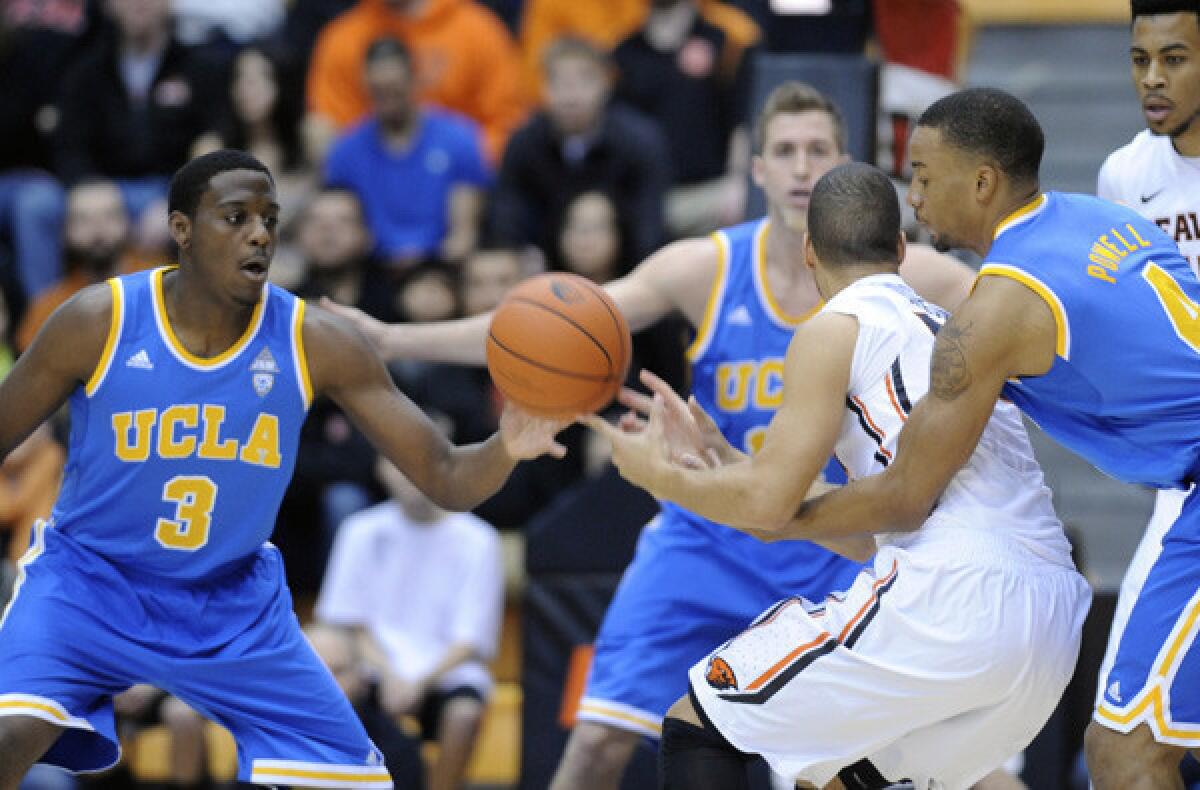UCLA has been hurt by loss of intensity

- Share via
UCLA basketball Coach Steve Alford saw the bad habit form in practice.
“You’d get a good hour, then the next 20 minutes you’d see the intensity drop,” Alford said.
The players noticed things weren’t right in recent games against California and Oregon, but the Bruins won anyway.
“It started on the defensive end, then we had trouble scoring,” said point guard Kyle Anderson.
It took a free fall during the 71-67 loss to Oregon State on Sunday before there was full acknowledgment of a problem.
The Bruins took another in-game sabbatical, allowing the Beavers to wrench control. By the time UCLA rejoined the game, it was too late.
It was the third consecutive game that a second-half nap turned into an extended coma.
Against Cal, the Bruins led, 51-32, with 15 minutes left before the Golden Bears went on a 20-4 run. By the time UCLA shook loose the cobwebs, Cal was within three points.
Against Oregon, the Bruins led, 65-54, with six minutes left before the Ducks scored 14 consecutive points to surge to a three-point lead. UCLA rallied to escape with a 70-68 victory.
Against Oregon State, the Bruins couldn’t overcome their drought. UCLA’s 52-47 lead with eight minutes left was dissolved by an 18-2 Oregon State run. And this time, instead of finding a finishing kick, the Bruins were left kicking themselves.
“We have to learn from that,” said forward David Wear.
UCLA will try to rebound Saturday night when the Bruins (17-5 overall, 6-3 Pac-12) visit the Galen Center to play USC (10-12, 1-8). It’s an important game for UCLA and a chance for USC to damage its crosstown rival.
Everyone in the Pac-12 is chasing first-place Arizona, which has a two-game lead. UCLA is in second place, sitting just above the muddle that is the middle of the conference standings. Six teams have either four or five losses.
Practice, Alford hopes, makes perfect.
“I told the guys, ‘If we’re going 120 minutes, then we’re going 120 minutes,’” Alford said. “As coaches, we have to hold them accountable.”
After the Oregon State loss, Alford lashed out at his team in a locker room scolding that could plainly be heard in the media’s quarters next door. At one point, he barked, “You have a week to think about this one.”
Time is now up, and the Bruins claim to have answers.
Tempo, Alford said, is the key. He noted that the Bruins had 36 points in transition in a 107-73 victory over USC in a conference opener last month. UCLA had six points in transition against Oregon State.
“We’re an up-tempo team,” Alford said. “We did not run.”
The Bruins said they were not concerned with small runs by opponents that are typical of ebb and flow. “That’s part of the game,” Anderson said. “That’s just basketball.”
What does prompt concern is when an 8-2 run swells into something resembling a scene from a Harlem Globetrotters-Washington Generals game.
For example, the Bruins were cruising against Cal, leading by 19. The Bears started their claw back with one free throw by Justin Cobbs. Then they didn’t score again for two minutes.
But UCLA missed three consecutive jumpers in that span and the Bears got rolling while the Bruins stayed cold. UCLA missed nine consecutive shots, six from the perimeter.
During Oregon State’s winning run, the Bruins went one for seven from the field. Most, Alford said, “were good shots.” However, most of those, too, were from outside.
“We get into these one-on-one things on the offensive end, where guys are trying to get a quick basket,” Wear said. “You don’t want to completely stop the flow of the game, but there is urgency when the other team is on a 10-0 run. You’ve got to get a layup.”
Anderson’s play at point guard is pivotal. When he struggles, things can go bad fast for the Bruins.
Anderson committed turnovers on three consecutive possessions after UCLA took an 11-point lead against Oregon. He missed two outside shots and the front end of a one-and-one free throw during the Ducks’ run.
Of course, he also saved the Bruins, blocking a shot by Oregon’s Johnathan Loyd that would have sent the game into overtime.
“I have to get back to being an unselfish player again,” Anderson said. “It’s not like I’m playing selfish lately. I just have to get the offense going, get the ball to guys in position to make plays.”
Alford has tried to help by making adjustments. During stretches when the Bruins were teetering in the last three games, the coach used two timeouts.
“You try pressing, you try to change the offense,” Alford said. “You want to get [opponents] out of rhythm and get us out of the funk.”
After a timeout against Oregon, Jordan Adams scored on a layup and was fouled. His free throw tied the score, 68-68.
Against Oregon State, Tony Parker followed a timeout with a turnover.
“Sometimes it works, sometimes it doesn’t,” Alford said. “Sometimes you’re better off leaving it alone.”
The Bruins had a two-minute scramble that cut the Oregon State lead to 67-66 with 55 seconds left, but it was too little, too late.
“With two minutes to go, it was, ‘Oh my gosh, this isn’t working, let’s crank it up,’” Alford said.
“You can’t do that. The cranking up should have happened 38 minutes prior to that.”
Twitter: @cfosterlatimes
More to Read
Go beyond the scoreboard
Get the latest on L.A.'s teams in the daily Sports Report newsletter.
You may occasionally receive promotional content from the Los Angeles Times.







